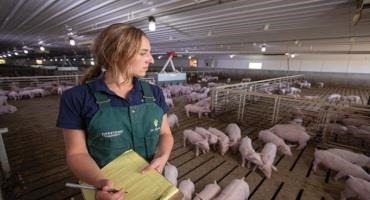Veterinarians are tracking antimicrobial administration and drug resistance in millions of pigs in a first-of-its-kind collaboration between the federal government and a private veterinary practice.
Veterinarian and researcher Dr. Scott Dee said the data collection from swine herds is for a long-term project to understand the role of antimicrobial administration in selection for drug resistance. Dr. Dee is director of applied research for Pipestone, which is a veterinary services, research, and farm management company based in Pipestone, Minnesota. The farms participating in the collaborative project are Pipestone clients, which are providing access to data from 160 sites housing swine.
Dr. Dee said Pipestone is helping fund the project, and he and his colleagues intend to publish and share the results.

Dr. Taylor Spronk, a veterinarian with Pipestone, co-leads a collaboration with the U.S. Department of Agriculture to collect and analyze data on antimicrobial administration and drug resistance from swine farms. (Courtesy of Pipestone)
“Our duty as veterinarians is to go out and scientifically collect good data and make good conclusions to really start evaluating the relationship of use and resistance,” Dr. Dee said. “That’s just being a good steward of antibiotics.”
The U.S. Department of Agriculture announced the partnership Nov. 30, 2021, hailing the collaboration as a potential model for future studies to monitor antimicrobial use and resistance. The announcement indicates Pipestone is collecting and sharing anonymized data with the USDA Animal and Plant Health Inspection Service’s National Animal Health Monitoring System.
APHIS officials hope to publish initial results sometime in 2022.
In response to questions, APHIS spokesperson Joelle R. Hayden provided a written statement from APHIS leaders on the project. They wrote that the project is a unique collaboration among APHIS, the private veterinary clinic of Pipestone Veterinary Services, and South Dakota State University’s Animal Disease Research and Diagnostic Laboratory, with financial support from the National Pork Board and the antimicrobial stewardship consortium within the Foundation for Food and Agriculture Research.
“This is the first time that the federal government, producers and veterinarians, and the swine industry have partnered on addressing antimicrobial resistance,” APHIS officials said. “This is exciting because it provides valuable context to the discussion on use and resistance.”
The project has already shown that monitoring antimicrobial use and resistance on a farm requires ample resources and expertise, APHIS officials said.
“Outcomes of this study will hopefully identify key pieces of information to monitor for the swine industry,” they said.
Dr. Dee said he hopes the study will last at least five years, which would give time to collect and analyze enough data to measure changes in antimicrobial administration and antimicrobial resistance.
The APHIS officials noted that, while the agency is on an annual funding cycle, the project collaborators were in their second year of data collection, and they had funding for the third. The project also aligns with previous commitments to understand development of antimicrobial resistance and prolong the effective use of antimicrobials, they said, citing the Antimicrobial Resistance Action Plan published by APHIS in 2014.
Click here to see more...